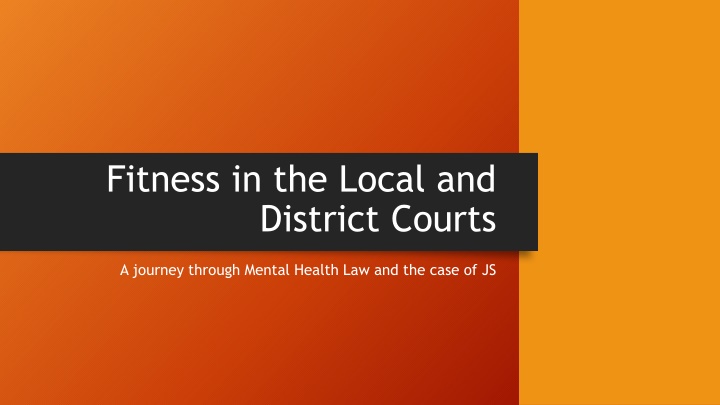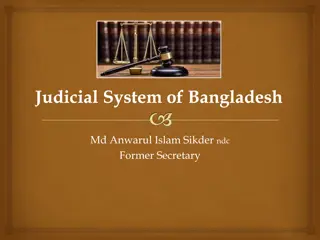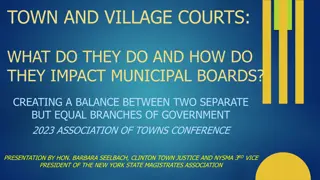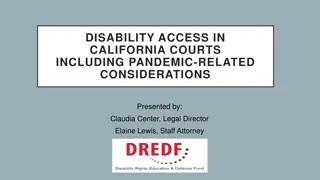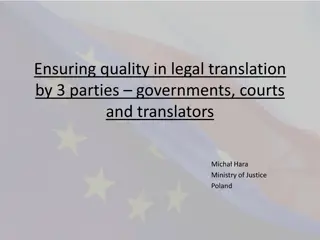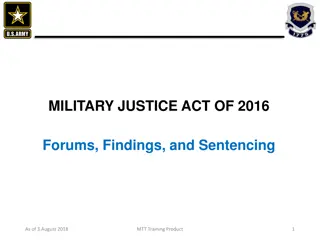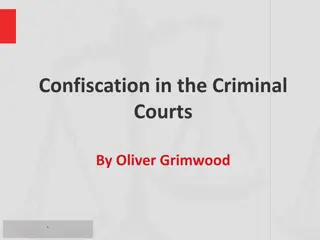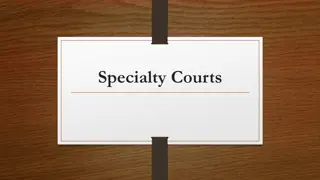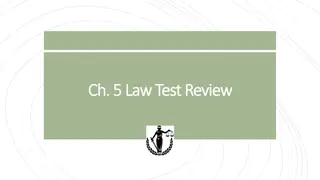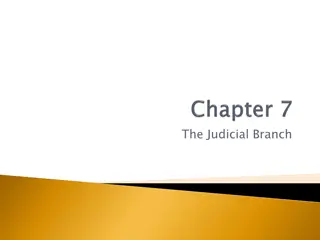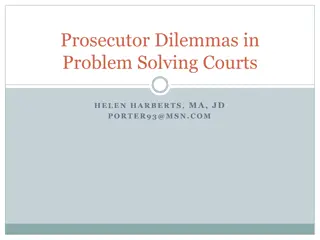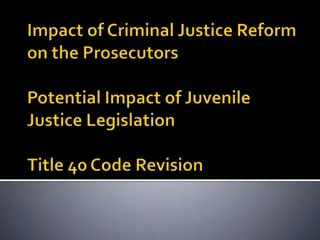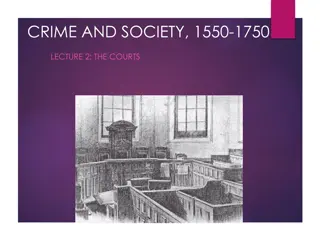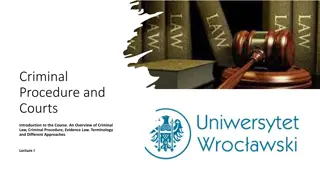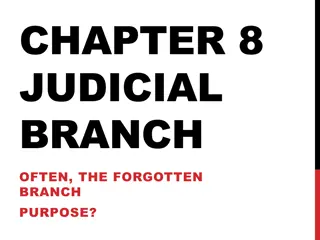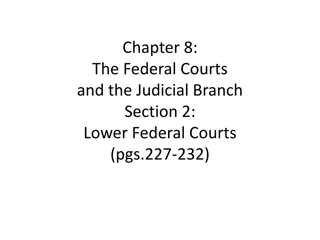Navigating Mental Health Law in Local and District Courts
Explore the journey of mental health law through the case of JS, highlighting the challenges and considerations involved in dealing with individuals with mental health issues in the legal system. From initial disorientation to legal orders and assessments, uncover the complexities of providing support and navigating the intersection of mental health and the law.
Download Presentation

Please find below an Image/Link to download the presentation.
The content on the website is provided AS IS for your information and personal use only. It may not be sold, licensed, or shared on other websites without obtaining consent from the author.If you encounter any issues during the download, it is possible that the publisher has removed the file from their server.
You are allowed to download the files provided on this website for personal or commercial use, subject to the condition that they are used lawfully. All files are the property of their respective owners.
The content on the website is provided AS IS for your information and personal use only. It may not be sold, licensed, or shared on other websites without obtaining consent from the author.
E N D
Presentation Transcript
Fitness in the Local and District Courts A journey through Mental Health Law and the case of JS
Initial Presentation and Conference Disorientation Allow clients to lead the conversation don t rush Mental Health and Intoxication Ask questions that orientate and build relationships Take file notes and ask for help!
JS a journey through mental health legislation Regional location with limited services Low level offences Persecutory beliefs and unwilling to engage No support in custody no JAS or support person Assumptions about intoxication
Section 19 MHCIFPA 19 Orders Magistrate may make A Magistrate may make one or more of the following orders (b) an order that the defendant be taken to, and detained in, a mental health facility for assessment and that, if the defendant is found on assessment at the mental health facility not to be a mentally ill person or mentally disordered person, the defendant be brought back before a Magistrate or an authorised justice as soon as practicable unless granted bail by a police officer at that facility,
Section 19 MHCIFPA considerations Not an application that you are making an order the court can make How the order is carried out not a consideration Immediate return not a consideration Just because not detained does not mean can give instructions on a plea Make sure to get all the paperwork for the return! Bail application mental health condition is not a danger to themselves or others
JS and the 18-minute mental health assessment 37 applications over a two year period Tick box return not mentally ill. No reasons, no methodology No room in the mental health ward Detainment requires intubation and transport Patient is at baseline what is baseline?
Section 14 MHCIFPA If the client is unfit there is no impediment to the LCM simply making a s14 especially s14(c) A key barrier is s15 and (b) the seriousness of the offending (e) the defendant's criminal history (f) whether the defendant has previously been subject to a s14 or s32 (g) whether there is a support plan None of these factors affect the making of a permanent stay
Sources of Evidence Hospital discharge summaries and reports Mental health hospital records NDIS provider reports or summaries Reports from JAS workers Justice Health Nurse Reports Justice Health Records from previous incarcerations Police records relating to previous interactions predominantly in relation to s22 where police take clients to hospital for mental health treatment. SIDMHOS Statewide Intellectual Disability Mental Health Outreach Services CARS Legal Aid assessments Orders of the Guardian including Financial Management Orders Affidavits from solicitors who have had previous dealings with clients. Previous reports compiled for court applications.
An Evidence Desert Summarise your evidence do not data dump the Magistrate Sometimes the best evidence is the difficulty getting evidence Exploring all possible avenues for evidence will make your affidavit that much more impressive and compelling Again a report based on one hour of interaction alone is not as good as one informed by all the available material
Section 20 MHCIFPA (1) Without limiting section 19(c), the Magistrate may make a community treatment order in accordance with the Mental Health Act 2007 for implementation by a declared mental health facility in relation to the defendant, if the Magistrate is satisfied that all of the requirements for the making of a community treatment order at a mental health inquiry under that Act (other than the holding of an inquiry) have been met in respect of the defendant. (2) The Mental Health Act 2007 (other than section 51(1) and (2)) applies to and in respect of the defendant and a community treatment order as if the order had been made by the Tribunal under that Act.
Briefing an Expert Don t just rely on the one meeting give them the evidence you have collected If you are going to present an affidavit in court this can be provided to the expert NB you may need to brief someone else to appear as you may become a witness Make sure you ask ALL the questions you need answered Don t data dump your expert
The Permanent Stay Prepare a Notice of Motion and Supporting Affidavit Make sure everyone is served with the evidence as early as possible File a s177 certificate with your expert statement to preserve your position on costs Make your client available for the prosecution expert but limited to not discussing the offences Written submissions make everyone s life that little bit easier
JS and the Permanent Stays When s14s are no longer an option because of the s15 criteria Threshold will be different for different clients and different LCMs Not the first port of call Reliant on all of the evidence gathered until this point What is the outcome? Discharge
Section 25 MHCIFPA 25 Transfer from correctional centre or detention centre (1) This section applies to a person who is awaiting committal for trial or trial for an offence or summary disposal of the person s case. (2) If it appears to a Magistrate that it may be appropriate to transfer a person to whom this section applies from a correctional centre or detention centre to a mental health facility under section 86, the Magistrate may make an order directing (a) that the defendant be examined by 2 medical practitioners, 1 of whom is a psychiatrist, and (b) that, if appropriate, the relevant certificates be given to the Secretary under section 86, and (c) that the Chief Executive, Justice Health or, in the case of a person who is under the age of 18 years, the Secretary of the Department of Communities and Justice to ensure that the Magistrate is notified of the action, if any, taken under section 86
Raising Fitness and Representations Fitness can be raised at any time Overlapping considerations of the Criminal Procedure Act, MHCIFPA and Crimes (Sentencing Procedure) Act Changes the EAGP process Put your evidence and your submissions out there representations wont put you in a worse position on these applications
JS and the SI matter Bail refused The 6 minute and 32 second DVEC The 5 month, 3 week, and 4 day certification process
Making it to the District Court When should the issue of fitness be heard? ASAP Fitness Hearings Not adversarial No onus of proof Will the accused likely become fit in the next 12 months
Everyone agrees JS is not fit The reports all say he is unfit The evidence is dense and from a long time period Time for the solicitor to become the witness and get the rewards of all the work that you have put in.
My client is unfit. What happens now? Do the ODPP want to proceed? Four possible verdicts 1. Not guilty 2. Special verdict of act proven but not criminally responsible because of mental health impairment 3. On limited evidence the defendant committed the act charged 4. On the limited evidence the accused committed an alternative available. Sentence at law or referral to the Mental Health Tribunal
JS is unfit is not the end of the story No discontinuation of the matter The three hour trial without instructions The agreement for JS to be living with his mother The broken TV The final penalty
